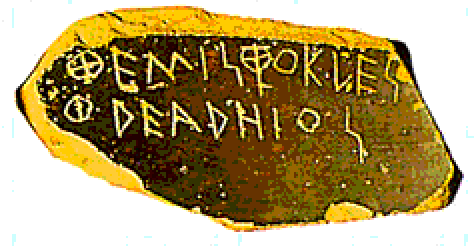
Fairly typical questions would be the following, covering material which has been dealt with in the first 4 weeks of the term. Note, however, that one way in which these sample questions are not all that "typical" is that some of these ask specifically about Aeschylus' Agamemnon - the only play of the trilogy which we have covered thus far. Questions on the actual test are more likely to ask about the Oresteia trilogy as a whole, or to combine the Oresteia with Sophocles' Oedipus the King, which we will also be reading.
(NOTE: Passages should be primarily identified by their ancient source, not their modern translator or compiler. For example, something from Starr's "Sources on Athenian democracy and imperialism" (pp. 193-211) should be identified as coming from Thucydides, the Old Oligarch, or the like, not "from Starr".) Likewise, discussion of a work such as Agamemnon should refer to the play as being by "Aeschylus", not "Lattimore".

1. What sort of document is illustrated above? What is the overall significance in the study of Greek civilization of this sort of document? Based on Starr's discussion, what is a probable date for this? What can you say about the writing on this document?
4. In the same spirit it is not allowed to caricature on the comic stage or otherwise libel the People, because they do not care to hear themselves ill spoken of. But if any one has a desire to satirize his neighbor he has full leave to do so. And this because they are well aware that, as a general rule, the person caricatured does not belong to the People, or the masses. He is more likely to be some wealthy or well-born person, or man of means and influence. In fact, but few poor people and of the popular stamp incur the comic lash, or if they do they have brought it on themselves by excessive love of meddling or some covetous self-seeking at the expense of the People, so that no particular annoyance is felt at seeing such folk satirized.
How does this document relate to other materials we have studied in this course?
How does this document relate to other materials we have studied in this course?
He who in time long ago was great,
throbbing with gigantic strength,
shall be as if he never were, unspoken.
He who followed him has found
his master, and is gone.
Cry aloud without fear the victory of Zeus,
you will not have failed the truth:
Zeus, who guided men to think,
who has laid it down that wisdom
comes alone through suffering.
Still there drips in sleep against the heart
grief of memory; against
our pleasure we are temperate
From the gods who sit in grandeur
grace comes somehow violent.
How does this passage fit into the overall development of thought in the work from which it comes? What individuals are referred to in the second of the three sections (i.e., "He who ... the truth) which are quoted here?